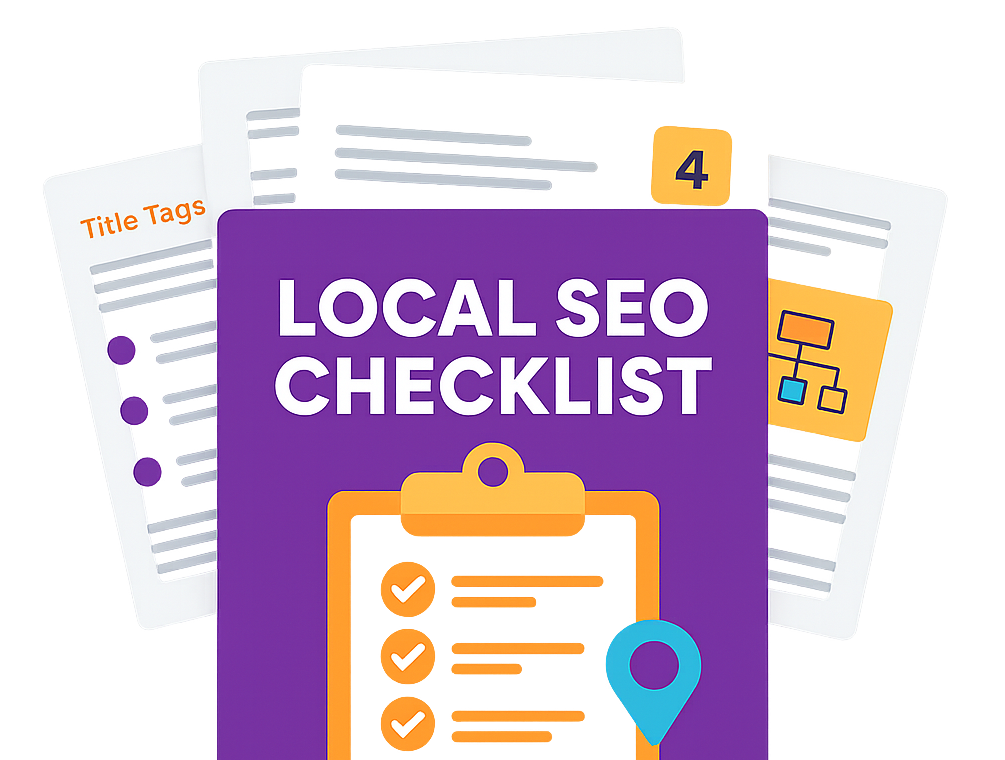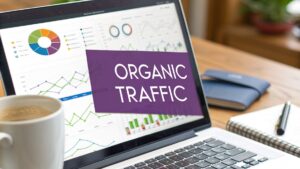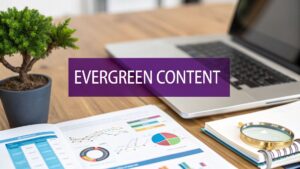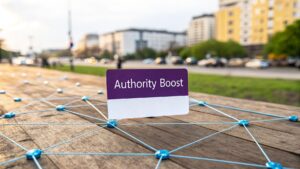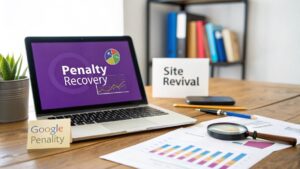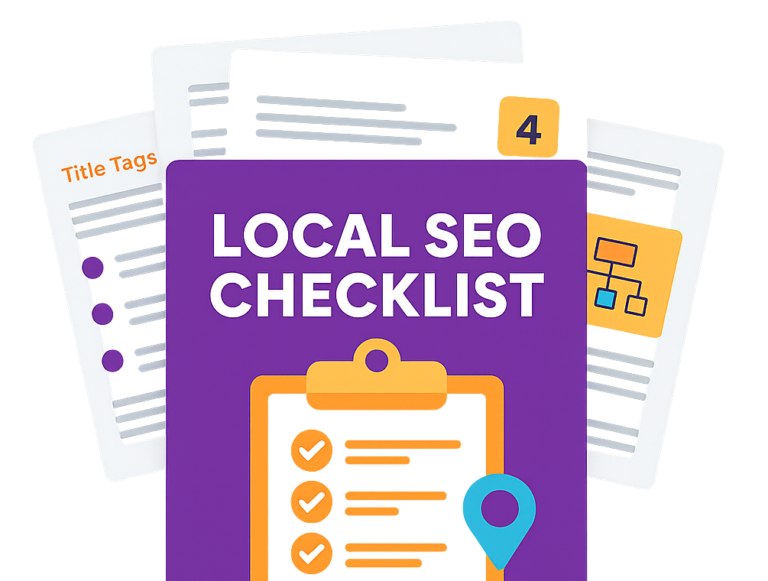The UK property market is more competitive than ever, and standing out requires more than just a listing on Rightmove. Successful estate agents are now leveraging a sophisticated blend of online strategies to attract, engage, and convert clients. Gone are the days when traditional methods alone could sustain a business; a powerful online presence is now essential for survival and growth.
This guide moves beyond generic advice to deliver a clear blueprint for success. We will break down the most effective digital marketing for real estate tactics, providing actionable, UK-specific insights you can implement immediately. From mastering local search engine optimisation (SEO) to creating compelling video content and building high-converting lead funnels, these eight strategies are designed to build your brand and generate a consistent flow of high-quality leads.
Prepare to explore each method in detail, complete with practical tips and real-world scenarios. This article will equip you with the tools needed to build a robust online presence, connect with modern buyers and sellers, and ultimately, close more deals.
1. Mastering Search Engine Optimisation (SEO) for Property Listings
In the competitive world of property sales, simply having a website is not enough. Search Engine Optimisation (SEO) is the foundational practice of refining your website and its content to appear prominently in search engine results. For estate agents, this isn't about generic visibility; it's a precise strategy focused on attracting high-intent buyers and sellers who are actively searching online for properties and agents in specific UK postcodes, towns, and cities. Effective digital marketing for real estate begins with ensuring your future clients can find you at the exact moment they need your services.

This process involves targeting local search terms like "3-bed house for sale in Cambridge" or "best estate agent in York," which drive highly qualified traffic to your listings. Unlike paid advertising, strong organic rankings build long-term trust and authority, positioning your agency as the local market expert.
How to Implement Real Estate SEO
A successful SEO strategy requires a hyper-local focus and a deep understanding of your client's search behaviour. Rather than competing nationally with giants like Rightmove, your goal is to dominate the search results for your specific service areas.
- Create Neighbourhood Landing Pages: Develop dedicated pages for each village, town, or neighbourhood you serve. Include local market statistics, information about schools, transport links, and amenities. This content not only attracts local searchers but also demonstrates your unparalleled local expertise.
- Optimise Your Google Business Profile: Your Google Business Profile is a critical asset. Regularly update it with high-quality photos, new listings, open house dates (using Posts), and encourage client reviews to boost your visibility in local map packs.
- Implement Property Schema Markup: Use structured data (schema markup) on your property listing pages. This helps search engines understand the specific details of a listing, like price, address, and number of bedrooms, which can lead to enhanced search result snippets.
- Build Local Backlinks: Strengthen your site's authority by earning links from other reputable local websites. Sponsor a local event, partner with a neighbourhood café for a promotion, or get featured in a local online publication. For more detailed strategies, you can learn more about SEO for Cambridgeshire estate agents.
2. Social Media Marketing
Beyond property portals and your own website, social media offers a dynamic arena to connect directly with prospective buyers, sellers, landlords, and tenants. It humanises your brand, transforming your agency from a simple service provider into a trusted community resource. A robust social media presence is a vital component of digital marketing for real estate, allowing you to showcase properties, share expertise, and build relationships long before a transaction is ever considered. Platforms like Instagram, Facebook, and even TikTok provide the perfect stage to tell your brand's story visually and engage with a local audience in real-time.

From behind-the-scenes glimpses of a day in the life of an agent to polished video tours of stunning homes, social media allows for creative and authentic brand building. It positions you as an approachable, modern, and knowledgeable expert in your specific market, building the trust necessary for clients to choose you for one of the biggest financial decisions of their lives.
How to Implement Real Estate Social Media Marketing
An effective social media strategy for estate agents blends high-quality property showcases with valuable, engaging content that serves the local community. The goal is to become the go-to social media authority for all things property in your area.
- Choose Platforms Wisely: Focus your efforts where your audience is. Instagram is perfect for high-quality visuals and property tours, Facebook is excellent for community engagement and targeted advertising, and LinkedIn is ideal for building your professional network and reputation.
- Utilise Video Content: Create engaging video content like Facebook Live virtual open houses, Instagram Reels showing property highlights, or short TikTok videos offering quick home-buying tips. Video captures attention far more effectively than static images.
- Engage Proactively and Authentically: Social media is a two-way conversation. Respond to all comments and messages promptly, ask your audience questions, and run polls to encourage interaction. Share user-generated content, such as a photo from a happy client in their new home, to build social proof.
- Leverage Targeted Advertising: Use the powerful advertising tools on platforms like Facebook and Instagram to run hyper-targeted campaigns. You can target users by location, income, life events (like "recently married"), and interests related to property buying, ensuring your listings reach the most relevant audience. To streamline your content creation and ensure consistency, consider using an AI social media content generator for real estate.
3. Google Ads and Pay-Per-Click (PPC) Advertising
While SEO builds long-term authority, Pay-Per-Click (PPC) advertising offers immediate visibility and lead generation. PPC campaigns, primarily run through Google Ads, allow estate agents to place targeted advertisements at the very top of search results pages. This means your agency can appear instantly when potential clients are actively searching for properties or agents, bypassing the slower process of organic ranking for hyper-competitive terms. For a robust digital marketing for real estate strategy, combining the steady growth of SEO with the rapid impact of PPC is essential for dominating your local market.

This powerful approach allows you to capture high-intent traffic from day one. Whether it’s an investor searching for "we buy houses in Bristol" or a family looking for a "5-bed detached home near Cambridge," PPC puts your brand directly in their path at the moment of peak interest, driving immediate enquiries and valuations.
How to Implement Real Estate PPC
A successful PPC strategy requires precision targeting and continuous optimisation to ensure your advertising budget delivers a strong return on investment. The goal is to generate high-quality leads without wasting money on irrelevant clicks.
- Create Buyer vs. Seller Campaigns: Separate your campaigns based on user intent. A seller campaign might target keywords like "estate agent fees Manchester," while a buyer campaign focuses on "flats for sale in Islington." This separation allows for highly relevant ad copy and landing pages.
- Use Negative Keywords: Actively build a list of negative keywords to prevent your ads from showing for irrelevant searches. For example, if you don't handle lettings, you would add words like "rent," "rental," and "to let" to your negative keyword list to avoid wasted ad spend.
- Implement Robust Conversion Tracking: It's vital to track what happens after someone clicks your ad. Set up conversion tracking for phone calls made from the ad, contact form submissions, and valuation requests to measure your campaign's true effectiveness.
- Test Hyper-Local Ad Copy: Experiment with ad copy that highlights your local expertise. Mentioning specific neighbourhoods, landmarks, or your years of experience in the area can significantly increase click-through rates. You can even use advanced tools to improve your targeting; discover more about leveraging AI for advertising on bare-digital.com.
4. Email Marketing and Lead Nurturing
While social media and SEO capture initial interest, email marketing is where relationships are built and sustained. This strategy involves creating a database of potential buyers, sellers, and past clients, then nurturing these leads through personalised and valuable email campaigns. It’s an essential component of digital marketing for real estate because it keeps your agency top-of-mind, guiding prospects through their decision-making process until they are ready to transact.

Unlike fleeting social media posts, email delivers your message directly to a curated audience that has already expressed interest in your services. From automated new listing alerts to monthly local market reports, email campaigns establish your authority and ensure you are the first agent they call when the time is right.
How to Implement Real Estate Email Marketing
A powerful email strategy relies on segmentation and automation to deliver the right message to the right person at the right time. Your goal is to provide consistent value, not just sales pitches, to build trust and maintain engagement over the long term.
- Segment Your Subscriber Lists: Divide your email contacts into specific groups such as first-time buyers, potential sellers, high-net-worth prospects, or past clients. This allows you to send highly relevant content, such as a seller’s guide to one group and new starter-home listings to another.
- Automate Nurturing Sequences: Use a real estate CRM like Chime or Follow Up Boss to create automated email sequences. A new buyer lead could receive a welcome email, followed by a guide to the local area, and then weekly property recommendations that match their criteria.
- Provide Actionable Market Insights: Send monthly newsletters with local market statistics, recent sales data, and price trends. This positions you as the local expert and gives contacts a compelling reason to stay subscribed.
- Optimise for Engagement: Use compelling subject lines that create urgency or curiosity, like "New detached home just listed in CB4" or "Cambridge property prices: Q2 update." Always include high-quality property photos, clear calls-to-action, and links to virtual tours.
5. Content Marketing and Blogging
Beyond property listings, content marketing allows estate agents to build trust and authority by providing genuinely useful information to potential clients. This strategy involves creating and sharing valuable, relevant content – such as blog posts, guides, and market analyses – that addresses the key questions and concerns of buyers and sellers. By positioning your agency as a go-to educational resource, you attract an audience at various stages of their property journey, nurturing them long before they are ready to transact. This form of digital marketing for real estate establishes your expertise and keeps your brand top-of-mind.
This approach moves the focus from a direct sales pitch to building a relationship. For instance, a first-time buyer might find your "Guide to Buying a Home in Cambridge" through a Google search. This single piece of content can capture their details, demonstrate your local knowledge, and start a conversation, proving far more effective than a simple advert.
How to Implement Content Marketing
A successful content strategy is built on a deep understanding of your local audience's needs. The goal is to become the definitive source of property information for your specific service area, answering the questions people are actively searching for online.
- Focus on Hyper-Local Topics: Create neighbourhood spotlights, school catchment area guides, and analyses of local market trends. Content like "The Best Places to Live in Cambridgeshire for Commuters" will attract a highly relevant audience.
- Develop Evergreen Resources: Produce timeless content that remains valuable for years, such as a "First-Time Home Buyer's Checklist" or a "Guide to Selling Your Property." These assets will continuously attract organic traffic and leads.
- Incorporate Local Data: Use statistics from your local MLS or property portals to create insightful market reports and updates. This data-driven content positions you as a true market expert and provides unique value.
- Leverage Internal Linking: Guide readers through your website by linking between your blog posts and relevant property listings or service pages. You can discover more about these internal linking strategies for SEO on bare-digital.com.
6. Video Marketing and Virtual Tours
In an increasingly visual digital landscape, static photos are no longer enough to capture a buyer's imagination. Video marketing and virtual tours have become indispensable tools, allowing potential buyers to experience a property's flow, atmosphere, and true character from anywhere in the world. This strategy is a cornerstone of modern digital marketing for real estate, transforming passive browsing into an immersive and engaging experience. High-quality video content not only showcases a property but also reflects the professionalism and technological savvy of your agency.
From cinematic property showcases reminiscent of luxury lifestyle programmes to practical Matterport 3D tours, video caters to modern buyer expectations. It allows you to tell a compelling story about a home, building an emotional connection that static images often cannot achieve. This approach has proven essential for attracting serious, pre-qualified buyers who have already virtually "walked through" the property before an in-person viewing.
How to Implement Real Estate Video Marketing
A successful video strategy combines different formats to appeal to various buyer segments across multiple platforms, from your website to social media channels. The goal is to make your listings unforgettable and easily shareable.
- Create Professional Property Walkthroughs: Invest in stabilised, well-lit video tours that guide viewers through a property. Keep these videos concise, ideally under three minutes, highlighting the best features and creating a narrative that helps buyers envision themselves living there.
- Leverage 3D Virtual Tours: Offer Matterport or similar 3D tours as a standard for your listings. This allows users to explore a property at their own pace, providing an interactive and detailed view that builds significant buyer confidence before a visit.
- Utilise Social Media Video Formats: Create short, engaging video content for platforms like Instagram Reels and TikTok. Quick property reveals, "before and after" transformations, or neighbourhood highlight clips can go viral and dramatically expand your reach. For real estate, video isn't just a promotional tool; it's a way to offer immersive experiences. To get the best results, you can explore how to master video marketing for social media to boost engagement and ROI.
- Host Live Virtual Open Houses: Use Facebook Live or Instagram Live to host real-time virtual open houses. This format allows you to interact directly with potential buyers, answer their questions on the spot, and create a sense of urgency and community around a new listing.
7. Lead Generation Funnels and Landing Pages
A well-optimised website attracts traffic, but a dedicated lead generation funnel converts that traffic into actionable opportunities. These funnels are structured marketing systems designed to guide potential buyers and sellers through a series of touchpoints, nurturing them from initial awareness to becoming qualified leads. This involves creating targeted landing pages, offering valuable lead magnets, and deploying automated follow-up sequences. For agents, this is a crucial component of digital marketing for real estate, transforming passive browsers into engaged prospects.
Unlike a general website that serves many purposes, a funnel is a focused pathway with a single goal: capturing contact information. Whether offering a free home valuation or a detailed neighbourhood guide, the aim is to provide enough value to compel a user to share their details, initiating a direct relationship with your agency.
How to Implement Real Estate Funnels
Effective funnels are built around a clear value exchange. You provide valuable information or a useful tool, and in return, the prospect provides their contact details. The key is to make your offer irresistible to your target audience.
- Create Specific Landing Pages: A landing page is a standalone web page created specifically for a marketing campaign. For example, if you run a Facebook ad campaign targeting first-time buyers in a specific area, send them to a landing page offering a "First-Time Buyer's Guide to [Neighbourhood]", not your generic homepage.
- Offer Compelling Lead Magnets: Your lead magnet must solve a specific problem. A seller might be drawn to an instant online home valuation tool, while a buyer could be interested in a downloadable checklist for viewing properties or a local market report.
- Keep Forms Simple: In the initial capture stage, ask for minimal information – typically a name and email address is enough. You can progressively gather more data through automated email sequences or follow-up calls once the initial connection is made.
- Use Social Proof and Urgency: Incorporate client testimonials, logos of local publications you've been featured in, and recent sales statistics on your landing pages to build trust. For a deeper dive into how visual content can transform prospective leads into loyal clients, explore resources on how interactive video can guide customers through the sales funnel.
8. Local SEO and Google My Business Optimisation
While broad SEO casts a wide net, local SEO is the art of becoming the go-to estate agent in your specific patch. This strategy focuses on optimising your digital presence to dominate local search results, particularly the Google "map pack". For estate agents, this is non-negotiable, as nearly every property search begins with local intent. A powerful digital marketing for real estate campaign ensures you are highly visible to motivated buyers and sellers searching for services "near me".
This hyperlocal focus allows you to connect directly with clients in the neighbourhoods you know best. When someone searches for "estate agent in [Your Town]" or "property valuation [Your Postcode]", a well-optimised profile ensures your agency appears prominently, generating high-quality, geographically relevant leads and cementing your status as the local market authority.
How to Implement Local SEO and Google My Business
Your Google Business Profile (GBP) is often the first interaction a potential client has with your brand, making it a cornerstone of your local strategy. It acts as a digital storefront, providing critical information at a glance.
- Claim and Complete Your Google Business Profile: Ensure every section is meticulously filled out. This includes your business name, address, phone number, hours, and website. Use a high-resolution logo and add quality photos of your team, office, and recently sold properties.
- Encourage and Manage Reviews: Actively ask satisfied clients to leave reviews on your Google profile. Positive reviews significantly influence rankings and build trust. Crucially, you must respond to all reviews- both positive and negative- professionally and promptly.
- Utilise Google Posts: Treat your GBP like a social media feed. Share weekly updates using Google Posts to announce new listings, open house dates, share market insights, or highlight recent sales. This keeps your profile fresh and engaging for both users and Google's algorithm.
- Target Local Keywords: Weave local keywords naturally into your business description, services, and Google Posts. For example, mention specific neighbourhoods, postcodes, and local landmarks to signal your area of expertise to search engines. For a deeper dive, you can explore some of the best local SEO tools in 2023 to refine your approach.
Digital Marketing Strategies Comparison for Real Estate
| Strategy | Implementation Complexity | Resource Requirements | Expected Outcomes | Ideal Use Cases | Key Advantages |
|---|---|---|---|---|---|
| Search Engine Optimisation (SEO) | Moderate | Ongoing content creation, SEO tools | Long-term sustainable organic traffic | Local real estate businesses seeking organic leads | Cost-effective, builds authority, targets high-intent buyers |
| Social Media Marketing | Moderate to High | Content creation, advertising budget, community management | Real-time engagement and brand awareness | Agents targeting diverse demographics, visual-driven markets | Precise targeting, high visual engagement, builds trust |
| Google Ads and PPC Advertising | High | Budget for ads, campaign management, optimisation expertise | Immediate traffic and lead generation | Quick lead capture, competitive markets | Immediate visibility, measurable ROI, highly targeted |
| Email Marketing and Lead Nurturing | Moderate | Email platform, content creation, list management | High ROI with nurtured leads | Maintaining relationships, long-term nurturing | Direct communication, automated sequences, cost-effective |
| Content Marketing and Blogging | Moderate to High | Regular content creation, SEO knowledge | Authority establishment and SEO improvement | Educating buyers/sellers, long-term SEO benefits | Builds trust, repurposable content, long-term lead source |
| Video Marketing and Virtual Tours | High | Video production equipment/services, editing skills | Higher engagement, remote buyer reach | Luxury listings, remote/international buyers | High engagement, reduces in-person visits, viral potential |
| Lead Generation Funnels and Landing Pages | High | Technical setup, design, copywriting, automation tools | Higher conversion rates, qualified leads | Lead capture and automated nurturing | Measurable, scalable, automates follow-up |
| Local SEO and Google My Business | Moderate | Ongoing profile management, local citation building | High local visibility, map pack inclusion | Local agents and service providers targeting nearby clients | Free optimisation, builds local authority, high conversion |
Building Your Integrated Digital Marketing Blueprint
We have journeyed through eight foundational pillars of digital marketing for real estate, from the granular details of local SEO to the broad appeal of video marketing. The central message is clear: success in today’s property market is not achieved through isolated tactics. Instead, it is built upon an integrated, multi-channel strategy where each component strengthens the others. Your high-value blog content fuels your email newsletters, your social media presence amplifies your new listings, and your finely-tuned Google Ads drive qualified traffic directly to your bespoke landing pages. This synergy is what transforms disparate activities into a powerful, lead-generating machine.
The true advantage of a robust digital marketing framework is its resilience. While the property market ebbs and flows, a strong online presence provides a constant, reliable stream of enquiries. It establishes your authority, builds trust with potential clients before you ever meet them, and ensures you are the first name they think of when they decide to buy, sell, or let a property. Mastering these strategies is not just about gaining a competitive edge; it is about future-proofing your business and creating a sustainable model for growth.
Your Actionable Next Steps
To move from theory to implementation, it is crucial to take deliberate action. Avoid the trap of feeling overwhelmed by the possibilities. Instead, focus on incremental, strategic improvements that will deliver tangible results.
Here is a simple plan to get started:
- Conduct a Digital Audit: Honestly assess your current efforts against the eight strategies discussed. Where are your strengths? More importantly, where are the most significant gaps or opportunities for improvement?
- Prioritise One or Two Channels: You do not need to overhaul everything at once. Select one or two areas that promise the quickest wins or address your biggest pain points. Perhaps that is optimising your Google Business Profile for immediate local visibility or launching a targeted email nurturing campaign to re-engage your existing database.
- Set Measurable Goals: Define what success looks like. Is it a 20% increase in website traffic from organic search? Is it generating 10 qualified valuation leads per month via your new landing page? Concrete goals will focus your efforts and allow you to track your return on investment.
- Commit to Consistency: The most effective digital marketing for real estate is not about sporadic bursts of activity, but about consistent, sustained effort. Commit to a regular schedule of posting, blogging, and analysing your performance.
By systematically applying these principles, you will build a formidable digital blueprint. You will not only attract more clients but also build a recognised and trusted brand that stands out in a crowded marketplace, ensuring your agency thrives for years to come.
Ready to elevate your online presence but unsure where to begin? The team at Bare Digital specialises in crafting bespoke SEO and digital marketing strategies for businesses in the property sector. We can help you navigate the complexities of digital marketing for real estate and build a powerful engine for lead generation.


